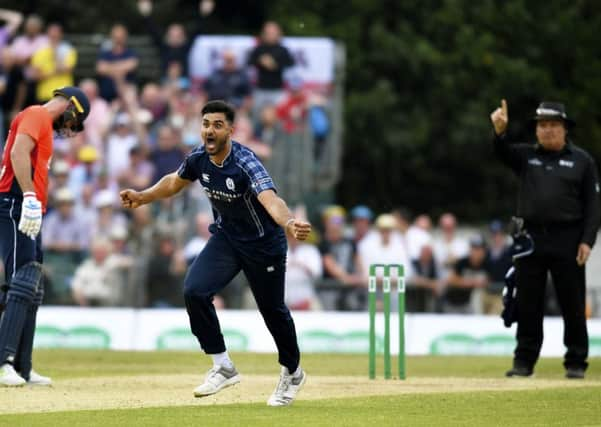World Cup is catching fire but poorer for absence of teams like Scotland


Following on from Bangladesh’s victory over South Africa it feels like, at last, the event has got going. The first four games were notable for their one-sided nature, raising again the accusation from critics about the format of the event, one which the ICC had lauded in part due to the potential for close competitive contests following the removal of the lower-ranked teams. Cricket simply does not work like that. It is as unpredictable a game as you can get, and no gauge or respecter of team’s world rankings.
Is Pakistan (world ranked sixth) beating England (world ranked one) really a massive upset? I would suggest not. Unexpected, maybe yes, but not a major upset. Kenya’s World Cup performance in 2003 and Ireland’s in 2007 yes, Ireland beating England in 2011 absolutely, and Scotland defeating England last year definitely. This is what creates interest and great stories, not forgettable ad hoc series sandwiched in before or after a Test series. The ICC have endeavoured to introduce more context to one day cricket with the new ODI League of 13 teams but nothing generates pressure and upsets like a World Cup.
Advertisement
Hide AdAdvertisement
Hide AdOf course, this is the game’s big conundrum when it comes to its showpiece event. A ten-team event is a retrograde step, especially when every other World Cup is expanding and it does nothing to grow the world’s second biggest game globally. However, this current format is the one which generates the ICC the most television and commercial income which then is reinvested (albeit unequally) in the game’s 100-plus members.
All countries, bar the top few, rely heavily on this income to survive, especially those nearest the top ten where the ICC fully supports semi and fully professional playing and coaching bases. It has been a long-running issue in the game and the balance between making the game’s showpiece event a real World Cup and also satisfying the game’s bankers is one the ICC have still not got right.
There are so few One Day Internationals that really mean anything and have consequence that World Cup matches are refreshing. No fall back of a five-match series, no chance for redemption tomorrow and no chance of the match being forgotten on the world’s cricket websites. Win and lose here and it means something. It is really the only time that Full Members experience what it is like to be an Associate member when each game is crucial. This World Cup, however it plays out over the next weeks, is poorer for the absence of the likes of Ireland, Zimbabwe, Scotland, the Netherlands and the UAE amongst others. The only real shock result would be Afghanistan or maybe Bangladesh winning the whole event. Five of the other teams are former winners, England are favourites and hosts, and the remaining two teams are ranked third and fourth in the world. Hardly David v Goliath.
Nothing epitomises the ups and downs of performance more than the West Indies’ total dismantling of the now buoyant Pakistan team in game two. The West Indies, a team full of extravagant talent, youthful dynamism and the ageing “Universal Boss” in Chris Gayle, have made the biggest statement so far.
Whether this was a one-off performance or the start of a competitive campaign will be borne out in the next five weeks and especially against Australia today, but one thing is certain, the World Cup would have been far less interesting and weaker without them there.
Of course, barring a poor umpiring decision and some untimely rain, that was the fate they were so nearly dealt at the qualifying event and they could have had no complaints if this was the case.
With high quality young players like Hope, Lewis, Hetmyer and Pooran supporting Gayle they have the ammunition to score quickly and with a new crop of fast bowlers using the quick wickets to their advantage they have the requisite skills to thrive in modern day one-day cricket. With Andre Russell returning to the fold after a superb IPL to join his young captain Jason Holder as all-rounders they seem to have most bases covered. The lack of a top quality spinner may prove their downfall.
However, with the way they and others will play the game, consistency will be difficult to achieve. To play aggressively from ball one is high risk and it is a tactic that has especially served England amazingly well in recent times. High risk, no fear cricket is the modern way, and it is fantastic to watch. However, as England proved on Monday, the pressure of chasing scores of 300-plus in World Cups is significant, however talented, experienced and explosive your team may be.
Advertisement
Hide AdAdvertisement
Hide AdIf the English climate is kind, then bat will dominate ball throughout the event, which is why I believe it is wide open. Teams will both win and lose by wide margins and, if we are lucky and both teams fire together, we will get some close games.
India against England would be the marketeers and commercial director’s dream final and do most to both swell world cricket’s income and generate interest at home and abroad. However the rejuvenated Australians with David Warner and Steve Smith playing again and the West Indies will I predict be those most likely to challenge.
l Roddy Smith was chief executive of Cricket Scotland from 2004 to 2014.